 Photo by Adam Sandor Nagy.
Photo by Adam Sandor Nagy.
French Vanilla are here to change your mind about Los Angeles punk. The forward-thinking, radical quartet are invite you to shake a tail to songs that make strong statements about the dominant structures of power that dominate both the mainstream and underground spheres.
Made up of vocalist Sally Spitz, guitarist Ali Day, saxophonist and bassist Daniel Trautfield, and drummer Max Albeck, and formed while Day and Spitz were students at UCLA, French Vanilla have steadily built up a fanbase with their uncompromising and thoroughly infectious music, which is just as much informed by performance art as it is by the post-punk music they set out to emulate (Day learned to play guitar specifically for the band and still doesn’t know basic chords.)
Though they didn’t plan it this way, French Vanilla are part of a new crop of LA artists making a distinct turn away from the garage and psych music that has dominated the city in recent years for music that is as much about the message as the medium. The band’s chosen subjects, ranging from global warming and feminism to the embarrassment of adolescence and patriarchal ideologies, may be challenging but their music is not, hallmarked by groove-laden, danceable rhythms, Day’s quirky guitar lines, Trautfield’s crisp saxophone blasts, and Spitz’s wailing, powerful vocals and whirling dervish live presence. Their new music video for “Evolution of a Friendship,” which we premiere here, was filmed in various locations around Los Angeles, including famed DIY venue The Smell, perfectly encapsulates the band’s humor, visual sensibility, and connection to the LA underground music scene.
The band’s minimal art-punk sound has netted them fans in Girlpool and Chastity Belt, both of whom French Vanilla have opened for in the past year and with the release of their debut record, available on tape via LA-based Danger Collective Records, French Vanilla’s profile is poised to grow even further..
We met up with French Vanilla at guitarist Ali Day’s East Hollywood apartment to discuss the current LA scene, recording their debut, and the function of underground music and DIY spaces in the current national climate.
What got you started on making music?
Day: I always wanted to be in bands but had never learned an instrument and never had taken music classes at school. Then in college I was like, okay I’m going to learn because having Sally as a friend and being inspired by the same kinds of music, it seemed like the right opportunity.
What about you, Sally?
Spitz: I was doing performance art. I got into doing that and exploring how I could affect my audiences with music. When I listen to music I feel very emotional, and I realized it was like a tool, playing music is like a weapon. Then Ali and I would talk about it and share our politics and I met Daniel through Ali. Daniel’s the maestro.
Day: He’s the backbone.
Spitz: It all came together from sharing the same ideas and having similar beliefs about how we wanted to take control of our lives. Daniel and Ali were making basslines and guitar parts together so we kind of got the ball rolling together that way.
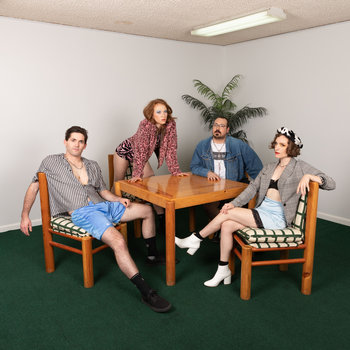
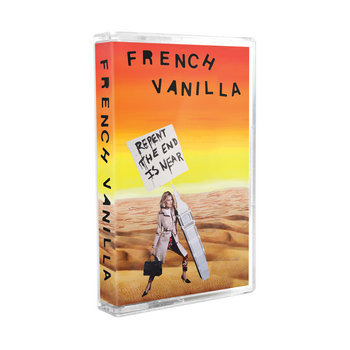
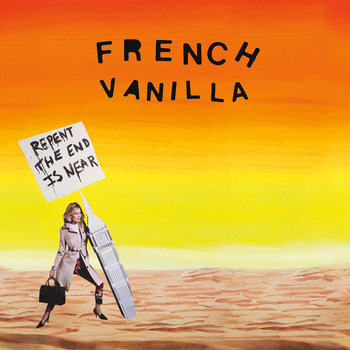

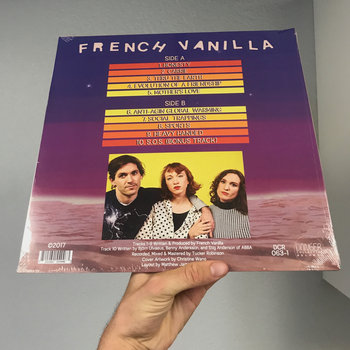
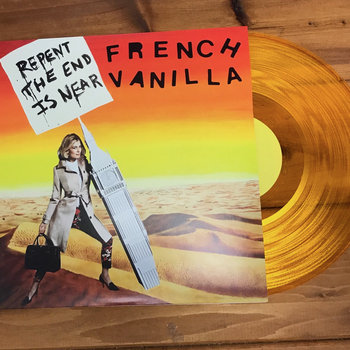

Cassette, Compact Disc (CD), Vinyl LP




Ali, did you learn to play guitar specifically for French Vanilla?
Day: Yes. I kind of purposefully didn’t learn conventional guitar. I still don’t know all the chords, the A-D-G or whatever. I kind of just learned songs that were in a style that I wanted to play like and based my whole thing off learning those. That might be good or bad. The first few songs we wrote I could hardly play. Am I good? I don’t know.
Did you know what you wanted French Vanilla to sound like before you started the band or did you discover that as you learned to play?
Trautfield: I think we had a rough idea, but it’s kind of gone away from that concept a little bit.
Day: At the beginning we were very inspired by post-punk and stuff from the early 80s and late 70s but now we’ve kind of brought more genres into it. It’s evolving.
It’s pretty apparent when you listen to French Vanilla’s records that politics and social issues are a big part of your music. Is that something that’s very intentional in that you want to communicate those ideas or is it just what you’re interested in writing about?
Day: Well, you know, write about what you know! Those things are important to us and it is intentional but it’s also what we think about a lot.
Spitz: I think we want to be intentional with what we’re doing and how we’re spending our time and we want to connect with audiences. We try to open up and talk about how we think to find our community and find our voice.
Day: Especially in this Southern California scene, there’s so much empty message music. For me, that gets pretty boring. So we definitely want to talk about politics and social issues that are important to us and affect our lives and the people we know, their lives.
Spitz: I think can use dance music or music that’s generally considered to be less intellectually heavy to communicate. If people start to get into something physically, like start to move physically, then it’s more likely they’ll be able to connect more with what it’s about.





Cassette, Compact Disc (CD), Vinyl LP




Your new record sounds really good, it’s very clear and you can hear all the parts very distinctly.. Sometimes post-punk can sound very tinny and yours doesn’t have that quality at all. What was the recording process like?
Spitz: It was really a dream because we worked with Tucker Robinson, who’s an old friend of my boyfriend’s from high school days in Nashville. He lives in LA and he’s a professional recording artist and has recorded Die Antwoord and Rihanna and Beth Ditto and all kinds of cool artists. So he was down to help us because he likes French Vanilla and he’s a friend. So we went to his studio in Agoura Hills and recorded all the parts.
Day: It wasn’t really a studio, it was more like a weird warehouse space that he’s brought recording equipment into. We just did it over a weekend.
Trautfield: We mixed and mastered it in his room which is down the street from here. He’s a really amazing person to work with. We’ve recorded a bunch of times with various people and they were all really great, but this worked out a lot better.
What is your take on the LA scene in its current form?
Day: It doesn’t feel super healthy right now. So many DIY venues have been closing. There’s really kind of a lack of friendly venues or safe spaces right now what with perhspace leaving and the Smell under threat. As of July, they don’t know what’s going to happen.
Trautfield: The unfortunate shutdown of some really great community spaces for music has been an especial bummer considering the current political climate that we’re in. People feel more like they need to come together for empowering spaces.
Day: It’s at a point right now that, if a touring band asks us to help book them a show, I don’t know where to ask.
Trautfield: But I feel like there’s going to be an upswing.
Spitz: I feel like this could be a jumping off point, a time of transition and we’ll end up with more cool radical bands.
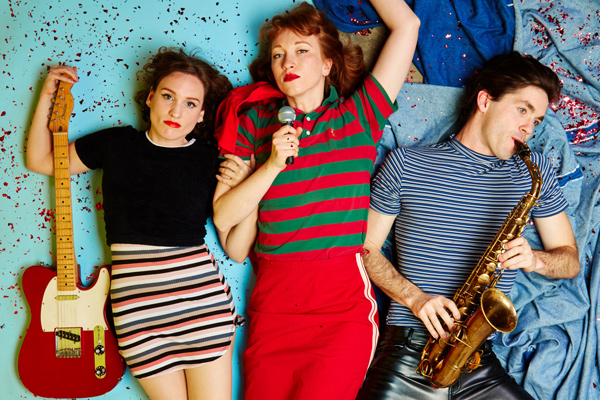
How is important is it for you to play all ages shows?
Trautfield: We were very conscious of that…we don’t often control where we play, we’re just responding to other people. But when we do take it under our control, we try and make sure that it’s an all ages space. But it’s getting harder and harder as venues disappear. Also because of that same thing, we end up playing at venues that are 21+.
Spitz: We don’t love playing weird bar shows.
Do you have any weird bar show stories?
Trautfield: We’ve only been heckled twice but, surprisingly, they’ve both been at a bar.
Given the current political climate, what do you think that the role of underground music should be or could be with all the cutting of the funding to the arts and the horrible politics we’re dealing with?
Spitz: It’s what we have right now for expressing ourselves. We can go out and feel supported and we can support each other at our shows. We can feel like we are doing something even if it’s really small and local. Every time we play a show we’re creating an opportunity to connect with audiences and get to a deeper level with ourselves. For me, I like pushing myself to places where I’m not totally comfortable with my performance because when I feel like i’m on the edge, I wanna be on the edge.
Day: I feel like now more than ever it’s important for us to make feminist or radical music. Growing up or what we tell girls now when we’re growing up, is that you can do anything you want. And that’s what I believed for a long time as a child. As I got older I realized that wasn’t true. I feel like the whole Donald Trump winning and Hilary losing thing felt like a big wake up call for people that equality hasn’t been reached. Before I wanted to make feminist music but now it feels even more earnest and important. I’m glad that we’re out there doing that. For the record, I always thought that Clinton would lose because she’s a woman, I maintain that. Just for the record.
Sally, you have a very unique singing style. Did you sing before French Vanilla?
Spitz: I have sung before, I was in a Bulgarian Women’s choir at UCLA with Este from Haim. It was weird.
Day: I didn’t know that! Were you hiding that?
Spitz: No, I never hid that. I had a tiny band before, I had a little thing with my friend that I was thinking about in terms of an art project. Then I took a New Genres class with Stanya Kahn. Stanya is one of my favorite artists and she made some work that was really influential for me with Harry Dodge. When I had her as a teacher she was explaining to me what I needed to look at if I wanted to do performance art that had anything to do with music. She showed me Nina Hagen and Diamanda Galas and Wendy O. Williams and all these people that just opened my whole world to what people, especially women, can do with their voice and thinking about it symbolically, like I want my voice to be powerful. So I started practicing on my own and I joined the women’s choir and that’s helped my voice a lot. I want my voice to be as loud and strong as possible coming from my physicality, but I want what I sing about to be…I want it to feel powerful.
Do you feel it’s important for French Vanilla, as a band in LA, to distinguish yourself from the dominant garage/psych scene in LA? I don’t live here anymore, but right before I moved away it did seem like there was a crop of new bands in the city that were making very different style of music than the kind of stuff that was coming out before. Not that those other bands are bad, but was that something you were thinking about?
Day: We definitely never set out to make music that was like that. That was definitely intentional. I don’t want to say that we’re not interested in that, but we’re not interested in that. And [those bands] have never in any way have taken any interest in us.
Trautfield: We try to keep away from dude rock.
Day: We’re anti-dude rock.
Trautfield: It’s bizarre to go to shows and still see that every band is four dudes. It’s crazy and it seems shocking that it’s still so dominant. We’ve had a tenuous relationship with mainstream and underground music. We’re too weird for mainstream music and not weird enough for underground music. A lot of the music that we really love is more avant-garde.
Spitz: I have respect for bands that are totally pushing up against art because even if no one sees it, that’s still real cool in my mind.
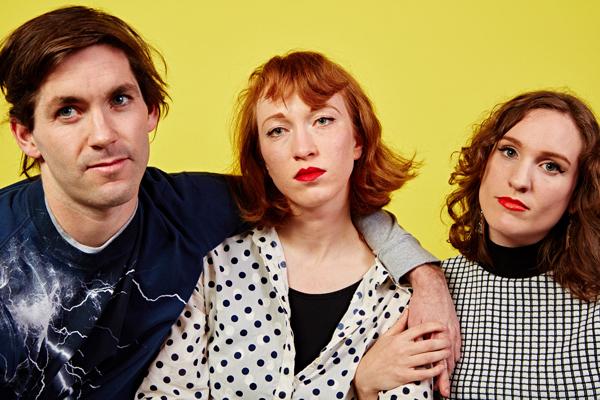
How do you guys feel about the term “Art-punk” for your band?
Day: I think we came up with that term. We have a hard time self-describing so that seems like a blanket moniker that we could fall under.
Trautfield: I don’t think any musician wants to be labeled as a genre. It’s nice but not nice at the same time to be labeled.
Spitz: “You’re like James Chance and the Contortions or B-52s!” I love both those bands.
Day: We used to self-describe as post-punk but it feels like that term has lost all meaning. I’ve seen a gamut of people describing themselves as post-punk. When we said that we mean like, Delta Five, but apparently it means nothing now.
Finally, how did you get your band name?
Trautfield: we had this idea that it was funny and tacky
Spitz: Tacky is key.
—Mariana Timony







